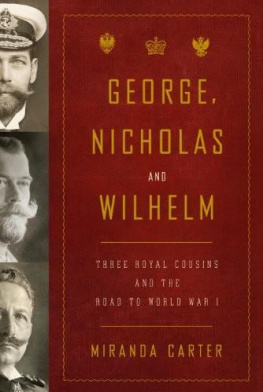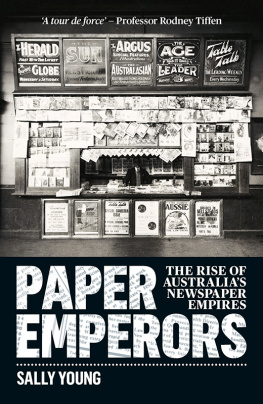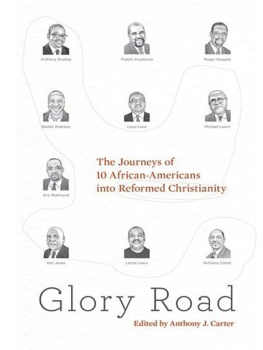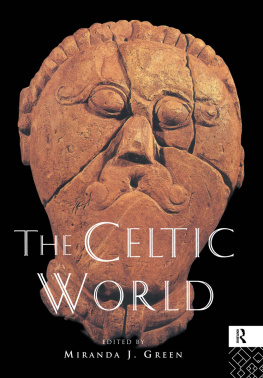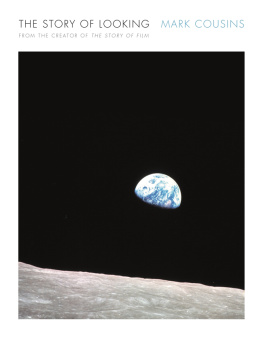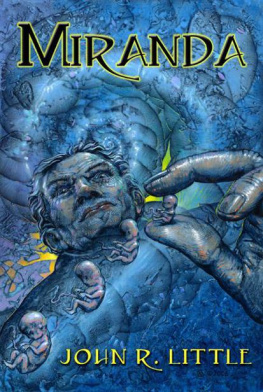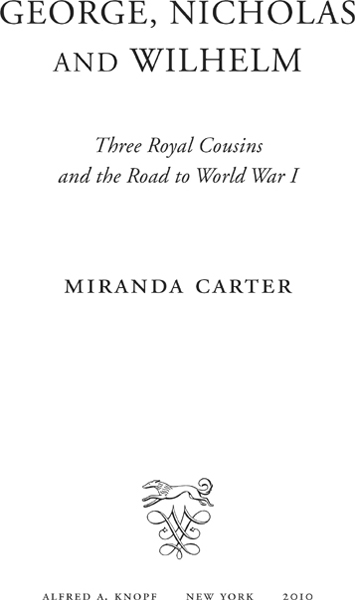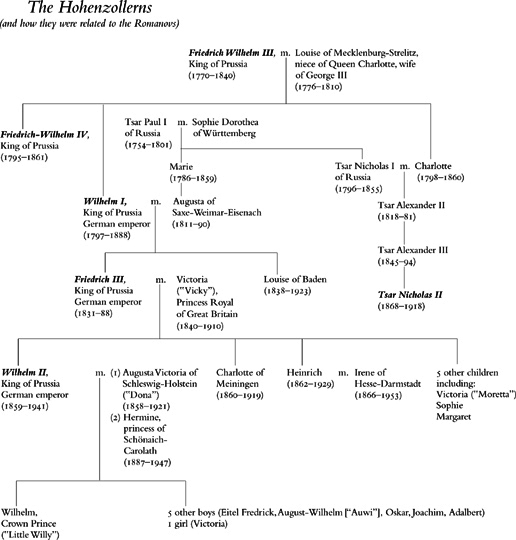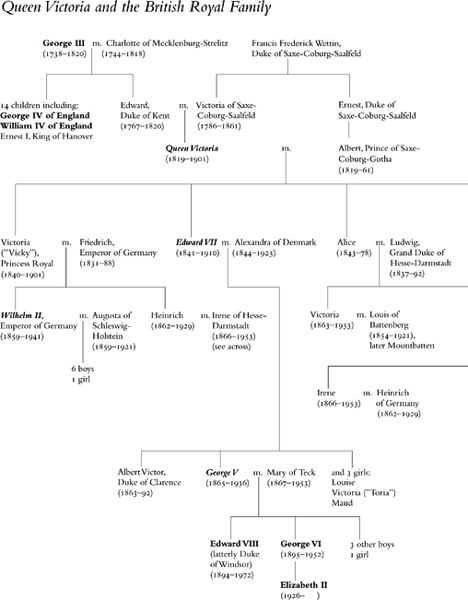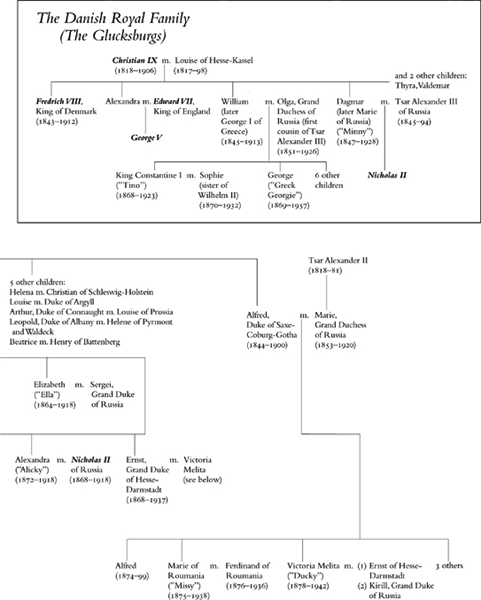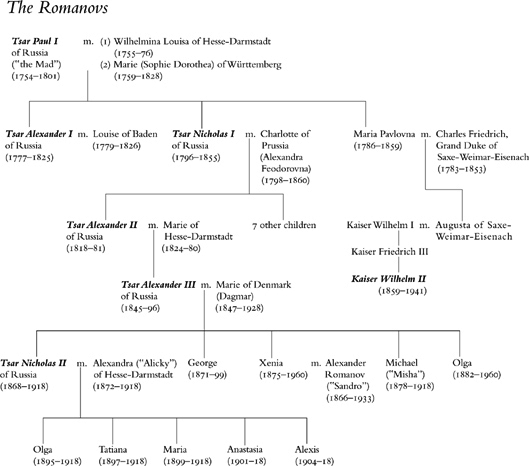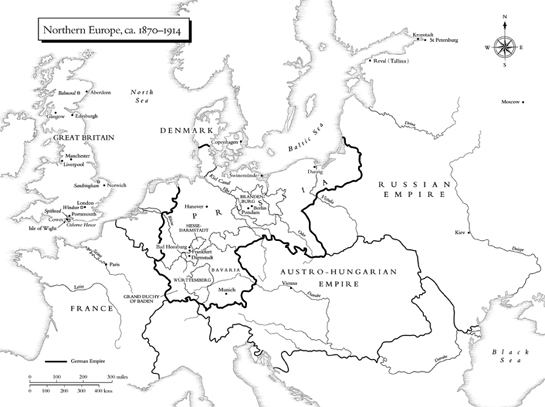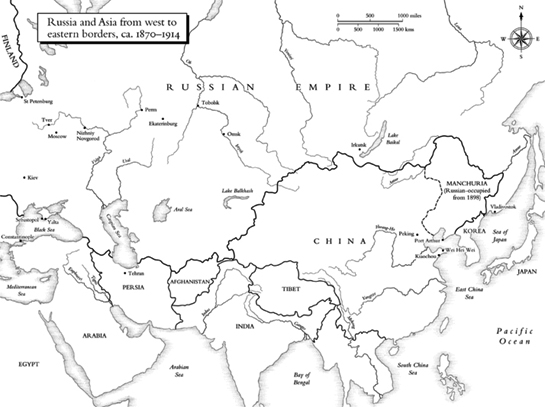Until 1918 Russian dates followed the Julian, or Old Style, calendar, rather than the Gregorian one we use today. In the nineteenth century this meant Russian dates were twelve days behind Western dates, and in the twentieth century, thirteen. In my notes I have used the abbreviation OS to mark Julian calendar dates.
I have also taken the decision, where the character or name has a well-established Western or Anglicized alternative, to go with the Anglicization, i.e., Leo instead of Lev (Tolstoy), Nicholas instead of Nikolai, Augusta Victoria instead of Auguste Viktoria, Hapsburg instead of Habsburg.
INTRODUCTION
July 1917, as the First World War reached its third exhausting year, was not a good month for monarchs. In London, George V, King of Great Britain and Emperor of India, decided to change his name. A month or so before, he had held a dinner party at Buckingham Palace. The occasion would have been slightly grimmer and plainer than usual for a European monarch. In an effort to show their commitment to the war effort, George and his wife, Mary, had instituted a spartan regime at the palace: no heating, dim lighting, simple foodmutton instead of lamb, pink blancmange instead of mousses and sorbetsand no alcohol. The king had taken a pledge of abstinence for the duration as an example to the nationan example to which it had remained noticeably deaf. Since there was no rationing in England, the aristocratic guests would almost certainly have eaten better at home. Nor, very probably, was the conversation precisely scintillating. The king and queen were known for their dedication to duty and moral uprightness, but not for their social adeptness: the King is duller than the Queen, went the refrain of a rather mean little poem by the society wit Max Beerbohm. During the course of the meal, Lady Maud Warrender, occasional lady-in-waiting to Queen Mary and a friend of Edward Elgar and Henry James, happened to let slip that there were rumours going round that because of the kings family nameSaxe-Coburg-Gothahe was regarded as pro-German. Hearing this, George started and grewhypersensitive to criticism and was prone to self-pity, though he tended to cover it with barking anger. The war had gnawed at him; it had turned his beard white and given him great bags under his eyes and somehow eroded him: observers said he looked like an old worn-out penny.
Things were worse for Georges cousin, Kaiser Wilhelm II, the German emperor. The war had once and for all destroyed the pretence that Wilhelmsupposedly the apex of the German autocracywas capable of providing any kind of consistent leadership. In early July the kaisers two most senior generals, Ludendorff and Hindenburg, threatened to resign unless Wilhelm sacked his chancellor. The gesture was a move to demonstrate and secure their hold over the civilian government. Wilhelm ranted and complained, but his beleaguered chancellor resigned anyway. The generals imposed their own replacement. They took away the kaisers title of Supreme Warlord and awarded it to Hindenburg. I may as well abdicate, Wilhelm grumbled. But he didnt, remaining the increasingly flimsy fig leaf of a military dictatorship. In Germany, they began to call him the Shadow-Emperor. (In Britain and America mass propaganda portrayed him as a child-eating monster, egging his troops on to ever greater atrocities.) Those closest to him worried about the serious declining popularity of the monarchical idea, and sighed over the levels of self-deceptionWilhelm veered between depression and his well-known, impossible, Victory mood. Through the hot July days, a virtual prisoner of the army, he shuffled from front to front, pinning on medals, then dining at some grand aristocrats large estates: Once more a rich dinner and the same bunch of idlers, a particularly disillusioned member of his entourage observed.
Further east, just outside Petrograd in Russia, at Alexander Palace at Tsarskoe Selo, the Tsars village, Georges other cousin, Nicholas Romanov, the former tsarto whom the king had always said he was devotedwas in his fourth month of house arrest since his abdication. Throughout July, Nicholas spent his days reading, cutting wood and pottering in the kitchen gardens of the palace. It was a life that in many respects suited him, and he seemed to greet his downfall with a stoic calmness that might even have been reliefbut then hed always been hard to read. On hot days his children swam in the lake, and his son Alexis showed the household his collection of silent films on his cinematograph. Beyond Tsarskoe Selo, Russian soldiers at the front were mutinying, and on 3 July angry workers, soldiers and Bolsheviks had taken to the streets of Petrograd. There was fierce fighting as the moderate provisional government struggled to stay in control. The city was full of furious rumours that the hated departure is; all packed, empty roomsit hurts so much.
Back in England, George came up with a new last name for himself: Windsorirreproachably English-sounding, and entirely made up. It established the British royal family once and for all as a slightly stolid but utterly reliable product of the English Home Counties. Though, of course, it wasnt. Saxe-Coburg-Gothalike Windsor, not so much a surname as a statement of provenancehad been given to Georges grandmother Queen Victoria (herself half-German) by his grandfather Albert, the Prince Consort, son of the German Duke of Coburg. It was redolent of the close relations and blood ties that linked the whole of European royalty, and which in Britain had been crowned by the fact that Kaiser Wilhelm was Queen Victorias eldest grandson. Georges father was Wilhelms uncle; his mother was Nicholass aunt; Wilhelm and Nicholas, meanwhile, were both second and third cousins, through the marriage of a great-aunt, and a shared great-great-grandfather, the mad Tsar Paul of Russia.


